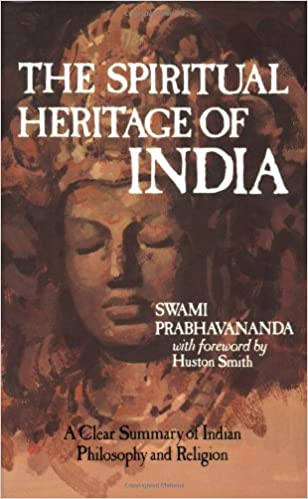![]()
"The real study, in religion, is first-hand experience of God.”

"We have said that the orthodox Hindu regards the Vedas as his highest written authority. Any subsequent scripture, if he is to regard it as valid, must be in agreement with them: it may expand them, it may develop them, and still be recognized, but it must not contradict them. They are to him, as nearly as any human document can be, the expression of divine truth. At the same time it would be a mistake to suppose that his allegiance to their authority is, in the final analysis, blind and automatic. If he considers them the word of God, it is because he believes their truth to be verifiable, immediately, at any moment, in his own personal experience. If he found on due examination that it was not so verifiable, he would reject it. If he found that any part of it was not so verifiable, he would reject that. In short, he conceives that his faith in the Vedas is as well founded, and on grounds exactly as critical, as in the natural scientist's belief in any physical law. And in this position these very scriptures themselves, he will tell you, uphold him. The real study, they say, is—not study of themselves—but study of that 'by which we realize the unchangeable'. In other words, the real study, in religion, is first-hand experience of God.” Swami Prabhavananda
“For the study of the Vedas, according to long tradition, and even according to
the Vedas themselves, one must have—as Yajnavalkya had—a master, or guru:
'Approach a teacher', says the Mundaka,1 'with humility and with a desire to
serve.' Elsewhere we read: 'To many it is not given to hear of the Self. Many,
though they hear of it, do not understand it. Wonderful is he who speaks of it;
intelligent is he who learns of it. Blessed is he who, taught by a good teacher,
is able to understand it.' 2
The function of the 'good teacher', as Hinduism conceives it, is twofold. He of
course explains the scriptures, the spirit as well as the letter; but, what is
more important still, he teaches by his life—by his little daily acts, by his
most casual words, sometimes even by his silence. Only to be near him, only to
serve and obey him in humility and reverence, is to become quickened in spirit;
and the purpose of the study of the Vedas is not merely or primarily to inform
the intellect, but to purify and enrich the soul:
Pleasant indeed are the study and teaching of the Vedas!
He who engages in these things attains to concentration of mind,
And is no longer a slave to his passions;
Devout, self-controlled, cultivated in spirit,
He rises to fame and is a blessing to mankind.3
We have said that the orthodox Hindu regards the Vedas as his highest written
authority. Any subsequent scripture, if he is to regard it as valid, must be in
agreement with them: it may expand them, it may develop them, and still be
recognized, but it must not contradict them. They are to him, as nearly as any
human document can be, the expression of divine truth. At the same time it would
be a mistake to suppose that his allegiance to their authority is, in the final
analysis, blind and automatic. If he considers them the word of God, it is
because he believes their truth to be verifiable, immediately, at any moment, in
his own personal experience. If he found on due examination that it was not so
verifiable, he would reject it. If he found that any part of it was not so
verifiable, he would reject that. In short, he conceives that his faith in the
Vedas is as well founded, and on grounds exactly as critical, as in the natural
scientist's belief in any physical law. And in this position these very
scriptures themselves, he will tell you, uphold him. The real study, they say,
is—not study of themselves—but study of that 'by which we realize the
unchangeable'. In other words, the real study, in religion, is first-hand
experience of God.”
The Spiritual Heritage Of India: A Clear Summary of Indian Philosophy and Religion
Swami Prabhavananda, Vedanta Press (June 1979) pp. 29-30
1. I. ii. 12.
2. Katha, I. ii. 7.
3. Satapatha Brahmana, Madhyandini sakha, XI. V. 7, Swadhyaya prasamsa, I.
Related Articles
Gnosis is mutual knowing and being known of and by God
The Gnostic Gospels: Self-knowledge is knowledge of God
The mystic makes contact with the god inside
Hinduism is about exploring the very depths of your own soul yourself
Authors of old Asiatic books claimed ultimate truth was discoverable
But if you do not know yourselves, then you dwell in poverty
The failure to attain direct experience of the truth
The real study, in religion, is first-hand experience of God.
For Lao Tze it is the Tao, in Jewish mysticism it is the Shekinah
Spiritual but not Religious
Disclaimer: Our material may be copied, printed and distributed by referring to this site. This site also contains copyrighted material the use of which has not always been specifically authorized by the copyright owner. We are making such material available to our readers under the education and research provisions of "fair use" in an effort to advance freedom of inquiry for a better understanding of religious, spiritual and inter-faith issues. The material on this site is distributed without profit. If you wish to use copyrighted material for purposes other than “fair use” you must request permission from the copyright owner.